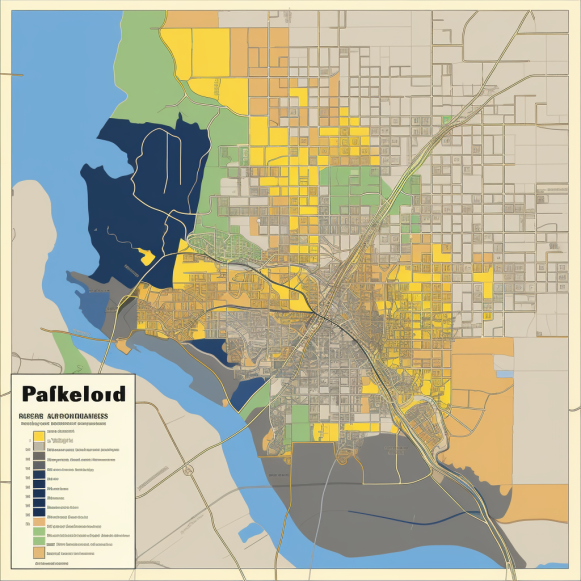Borenstein: Oakland election fiasco leaves uncertainty of who is in charge

City Clerk Asha Reed makes stunning claim that decision on boundaries for school board race is not her responsibility
At the end of last week, it appeared that Oakland’s latest election saga, this one involving the boundaries for an upcoming special school board election, had been resolved. It turns out it didn’t.
The dispute was finally resolved on a shaky basis on Tuesday. The election to fill a key vacant seat on the evenly divided seven-member school board representing District 5 will proceed as planned, using the correct pre-redistricting boundaries.
What has happened since Friday, however, raises troubling questions about why Oakland refuses to oversee its municipal election. And it suggests that, rather than owning and correcting her mistakes, Oakland City Clerk Asha Reed is attempting to shift blame to others.
This shambles was exposed last week, after the candidate filing period for the Nov. 7 election ended, when I pointed out that Reed was using incorrect district boundaries.
Reed intended to use “new” boundaries drawn up during the city’s redistricting in 2021. However, as stated in a state attorney general’s opinion, the “old” pre-redistricting boundaries in effect three years ago should be used.
This is due to the fact that the special election for the school board’s District 5 seat will choose someone to complete the final year of a term that was first decided by voters in 2020.
Everyone involved in the dispute has now agreed to stick to the old lines. Fortunately, both candidates — Jorge Lerma, a former principal and longtime education advocate, and Sasha Ritzie-Hernandez, a parent education organizer — live within the old boundaries and are therefore still eligible to run.
However, Reed, who is in charge of municipal elections, including school board races, refused to give the Alameda County elections office the direction it required to change the boundary for the upcoming balloting.
Instead, Reed abruptly claimed in an email to the elections office on Friday that the boundary issue was not her responsibility. “(W)e do not concede that the City Clerk’s Office is solely or even primarily responsible for setting the boundaries,” she wrote.
It was a stunning claim. Reed and her attorneys claimed that she could no longer make a key decision about which neighborhoods would be included after months of taking the lead in the planning for the Nov. 7 election, as she should have.
She did this after collecting candidate filing fees and instructing candidates and county election officials on which district boundaries would be used. And, just in case there was any doubt about who was in charge, Oakland’s website makes it clear that this is a city election.
Rather than admitting and correcting her error, Reed made the legally dubious claim that the boundary decision was not part of her job. This created uncertainty about who was in charge of the election and who had the authority to set the district boundaries for a special election.
That became clear when Tim Dupuis, the county elections chief, responded on Friday, saying that his office, which mails out and counts ballots, provides a ministerial service and is directed by the city. On the issue of election boundaries, he wrote, “We will need a clearer acknowledgement that this is the direction you are giving us.”
He was correct. His point of view was understandable. Dupuis hadn’t caused this mess, and he and the county apparently didn’t want to be blamed for the city’s error or held legally responsible for a boundary decision that wasn’t his to make.
It’s perplexing why the city clerk and her attorneys are attempting to shift blame for the election. If this were a regular election, Reed would undoubtedly be the winner. However, Reed is attempting to argue that this midterm election to fill a vacancy is unique.
Alameda County Superintendent of Schools Alysse Castro was required by state law to call the special election after the evenly divided school board failed to find a replacement to fill the vacancy. Reed cites a clause in Castro’s order to argue that the county is in charge.
It’s a ridiculous claim. Castro requested in her order that the county “render specified services to the district relating to the conduct of an election.” To begin with, it is unclear whether Castro had the legal authority to make that request because the state code section she cited only applies to “a governing body of any city or district,” which Castro is not.
But, as Dupuis’ attorney, Senior Deputy County Counsel Raymond Lara, noted in an email to the city on Tuesday, “my client receives scores of similar resolutions from cities requesting the (registrar of voters) to’render specified services’ to conduct the election, but they do not transform my client into the elections official of these cities.”
Dupuis’ Friday email, which requested clarity, went unanswered until I began questioning city officials about it on Monday. This prompted Oakland Deputy City Attorney Selia Warren to send an outlandish email falsely accusing the county of refusing to hold the election.
However, in her embarrassingly heated argument, Warren finally stated clearly for the first time to the county elections office the city’s position that the “old” boundaries should be used, while continuing to claim that the city is not responsible for making the decision.
Because the county believes, correctly it appears, that the city is in charge, Lara adopted Warren’s position as the direction the elections office required to adjust the boundaries used for mailing out ballots.
The immediate problem was resolved. However, the city’s troubling legal posture raises questions about whether Oakland officials are accepting responsibility for their own election.





